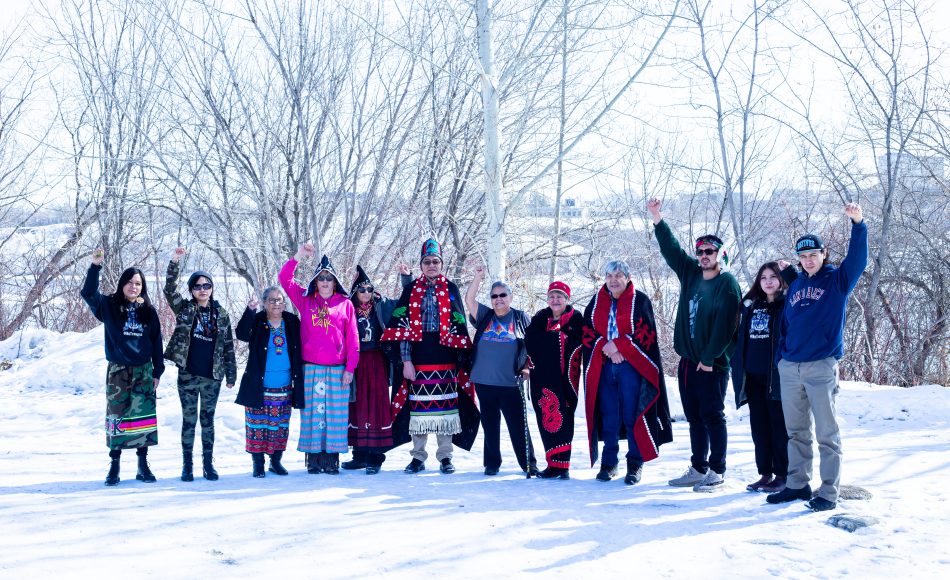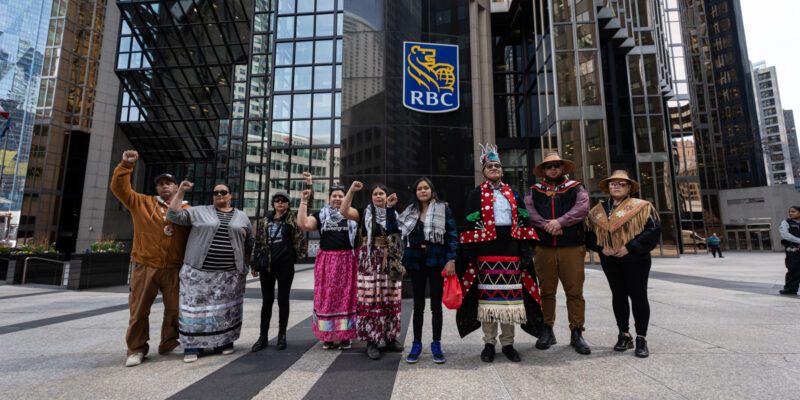
This op-ed was originally published in Ricochet written by Maya Menezes
Just days after another militarized raid on unceded Wet’suwet’en territory, land defenders arrived in so-called Saskatoon to speak truth to power at the Royal Bank of Canada’s Annual General Meeting.
They came to confront RBC about their support of a project that is at the root of extreme violence repeatedly unleashed on Indigenous people by the RCMP’s Community-Industry Response Group (C-IRG) — a unit created specifically to protect resource extraction projects on Indigenous lands. On March 29, C-IRG raided a Gidimt’en village site and arrested five Wet’suwet’en land and water protectors — mostly young women and girls, including Chief Woos’ daughter, Jocey.
At the AGM, Indigenous leaders were disrespected and “insulted” as they spoke about how the ongoing theft and destruction of their sovereign Title lands is in direct violation of the United Nations Declaration on the Rights of Indigenous Peoples (UNDRIP), of which Canada is a signatory. The delegation included land defenders from Mi’kma’ki to the Salish and North Seas.
It’s important to note that the delegation arrived with completed and processed proxy votes. These votes, according to all of RBCs internal rules, allow delegates to attend and speak. These proxies were signed in advance by shareholders who enthusiastically offered up their capacity to present and speak to AGM resolutions. Every form was processed ahead of time, every piece of identification approved, every hotel room and flight booked and paid for. And while it adds neither legitimacy nor validation to the delegation’s story, they carefully followed every single arbitrary rule, and yet they were still shut out of the proceedings.
Wet’suwet’en hereditary leadership — the rightful and legal titleholders of the land — oppose the CGL pipeline and have been fighting to stop the desecration of their land and waters, including the pristine and sacred river Wedzin Kwa, for over a decade.
True to form, RBC shareholders and executives in Saskatoon continued the pattern of colonial violence. Not only are they bankrolling toxic fossil fuel projects on sovereign Indigenous lands, delegates were racially segregated at the AGM.
To add profound insult to injury, senior vice president of RBC, John Stackhouse, came down to the registration desk after RCMP officers attempted to block proxy-holding Indigenous delegates from entering the hotel (where they were themselves paying guests) to personally inform the group that the AGM was full and there would be no place for them.
Moments later, allies who had already made it through registration confirmed that RBC had not yet even opened the doors to the room.
As Cree drummers and dancers sang, the hereditary chiefs approached the hotel registration. They were met with plain clothed RCMP officers who refused to let them pass, demanding to see their identification, an indignity not imposed on the scores of white delegates in suits walking in unobstructed.
Richard Brooks, Climate Finance Program Director at Stand.earth, who stepped in front of RCMP officers, said that he had, “Never in [my] life seen this type of racism, exclusion and physical intimidation at an AGM and [I’ve] been doing this work for decades.”
Security used different coloured badges to identify and separate delegates as they attempted to enter the main room. “After we followed their rules and registered as proxies they pushed us into a segregated room where we were left to address a wall,” said Kolin Sutherland Wilson of the Gitxsan Nation.
Wet’suwet’en delegates Eve Saint and Elder Aunty Janet, Indigenous Climate Action delegate Vanessa Gray, and Roishetta Ozane of the Vessel Project Louisiana, were among some of the Indigenous and Black women physically accosted and intimidated while attempting to gain entry to the main room. Elder Aunty Janet had hands laid on her by police in an interaction that was documented on video.
Ozane called the experience “some 19th-century Jim Crow law, segregation-type stuff. This is some back-of-the-bus, you-don’t-belong-here, get-on-your-side-of-the-street, drink-from-the-Black-only-water-fountain type of stuff.”
Some were able to gain entry to their segregated room while other allies made it into the main room. Inside, they challenged CEO Dave McKay and exposed the hypocrisy and violence of RBC with powerful speeches that silenced the room.
“CEO Dave McKay is personally responsible for the abuse Indigenous peoples received from RBC,” said Chief Na’Moks, Wet’suwet’en hereditary Chief. “This shows how Canada’s biggest bank has no interest in reconciliation or our human rights by implementing a two-tier rights system in separating Indigenous representatives from the main room.
“As much as RBC, Canada, and British Columbia try to extinguish our rights and title, we will remain the authority on our land,” Na’Moks said.
It’s not only the Wet’suwet’en who are impacted by RBC’s corporate colonialism. As Global News reported last month, RBC is deeply invested in the expansion of a massive coal mine in Germany, which includes the demolition of two villages.
In Australia, traditional owners of the Tiwi Islands are pursuing human rights complaints against 12 banks — including RBC — for involvement in a $4.7 billion gas project. The lawyer on behalf of the Indigenous owners said the project is having a serious impact on their economic, social and cultural rights. “[They’re] asking the banks to withdraw from this loan immediately,” she told Global News.
Elder Auntie Janet said RBC is directly contributing to the harm experienced by Indigenous people globally. “From its AGM to the yintah, RBC’s financing of projects like the Coastal GasLink pipeline have facilitated armed raids on Wet’suwet’en territory that attack and harm Indigenous women and land defenders.
“RBC can’t claim to take reconciliation seriously while funding violence against Indigenous women and land defenders on our own territories.”
Despite the disrespect shown to the Indigenous delegation, there were some glimmers from the AGM. Nearly one in three shareholders supported a resolution for Indigenous Free, Prior, and Informed Consent. And while RBC executives recommended that all shareholder resolutions on climate action and Indigenous rights in its proxy book be rejected, these resolutions received record and growing support.
Meanwhile, on the street outside the shareholder meeting, hundreds of people rallied in a drum circle and round dance calling on RBC to stop greenwashing, respect Indigenous sovereignty, and phase out all fossil fuel financing. There were powerful statements from local groups and frontline leaders from across North America, who peacefully danced in ceremony under the watchful eyes of rooftop RCMP snipers.
It’s not just the public increasingly holding RBC to account. The bank is currently under investigation by the Competition Bureau of Canada — a federal advertising watchdog — for allegedly misleading consumers with deceptive climate-related advertising while continuing to increase financing for coal, oil and gas.
Despite global climate commitments and public pledges, RBC is dragging us backwards, putting 99 per cent of its energy investment into fossil fuels. In 2022 alone, RBC financed over CAD $10.8 billion for companies involved in fossil fuel expansion, a 45 per cent increase over 2021 levels.
Yet RBC continues to attempt to dodge accountability. In what could be easily misconstrued as a line from early 2000s icon, Shaggy’s, hit song ‘It Wasn’t Me’, CEO Dave McKay told Indigenous delegates in the room that RBC’s hands should be considered clean. “We are responsible for understanding the risk of the project. I get that [RBC is] a financier, but we do not operate the project and it’s not fair to hold us accountable for anything that happens day to day in that project.”
McKay then said Indigenous concerns should be brought to “the owners or the government” for answers.
So why does RBC continue to back Coastal GasLink as a sustainable investment?
RBC is putting its proverbial head in the sand and doubling down on fossil fuel expansion, violating Indigenous sovereignty and rights, and enabling catastrophic climate chaos like fires and floods all to keep extracting as much wealth as possible for their shareholders, for as long as possible.
Across the world, nation states, apartheid regimes, police states and multi-billion dollar corporations are doubling down on increased fossil fuel expansion.
Communities and individuals are facing down targeted militarized invasions and the decimation of their ways of life to make way for more land theft across the world. In many places like the yintah, Indigenous peoples are the last line of defense.
Outside at the rally, allies waved the Palestinian flag to shine a light on the connection between struggles — just that morning a video went viral showing the violence inside Al-Aqsa mosque in occupied East Jerusalem, as the Israeli military carried out beatings and rained down gun violence on Palestinians in prayer during Ramadan.
RBC and the institutions, values, private wealth, and corporate greed it represents are using a playbook as old as time. Indigenous people have endured multi-generational attacks, from the first point of contact to the present day — which are all part of carefully calculated political decisions designed in the boardrooms of industry and war rooms government — people who refuse to acknowledge that Indigenous communities are still living through a genocide, for which the bodies of children continue to be unearthed.
Indigenous people are resisting their own destruction. That they must travel across the country to speak to the validity of their own suffering is a testament to how deeply colonialism has infiltrated our hearts and minds.
After the AGM, visibly shaken elders, hereditary chiefs, allies and supporters gathered at the Delta Bessborough Hotel in Saskatoon, Treaty 6. Grand Chief Stewart Phillips from the Union of British Columbia Indian Chiefs told delegates not to give up.
“I want to commend all the Indigenous peoples who came from so many communities to be here as part of our efforts to convince RBC, as a global leader in banking, that UNDRIP is not an option — it’s the law.”




